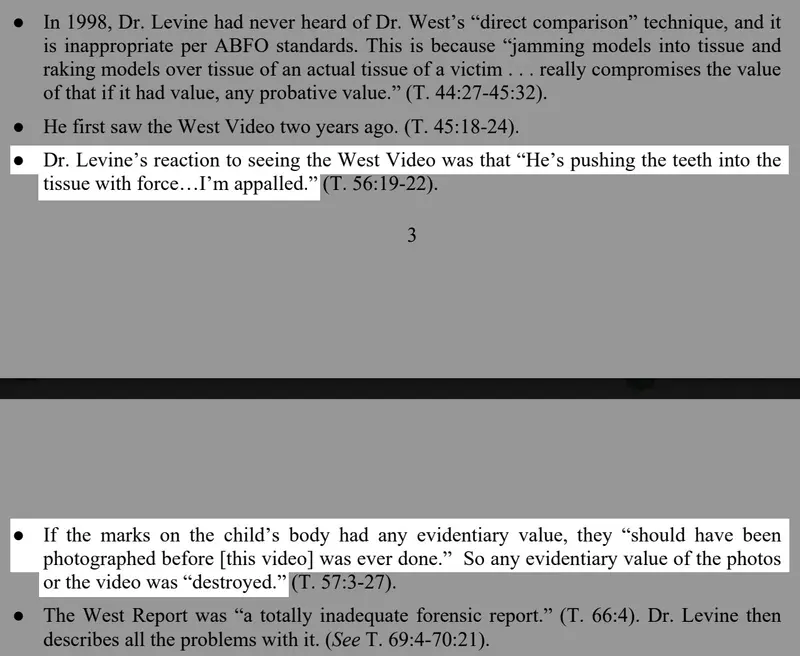This article was produced for ProPublica’s Local Reporting Network in partnership with Verite News. Sign up for Dispatches to get stories like this one as soon as they are published.

Trump’s Tariffs Have Done What No US Adversary Could
April 25, 2025
Trump’s Attorney General Warns Arrested Judge Is Just the Beginning
April 25, 2025A Louisiana judge this week set aside the first-degree murder conviction and death sentence of Jimmie Chris Duncan, whose 1998 conviction for killing his girlfriend’s 23-month-old daughter was based in part on bite mark evidence that experts now say is junk science.
The decision comes after a Verite News and ProPublica investigation in March examined the questions surrounding Duncan’s conviction as Gov. Jeff Landry, a staunch death penalty advocate, made moves to expedite executions after a 15-year pause.
Judge Alvin Sharp, of the 4th Judicial District in Ouachita Parish, pointed to new testimony during a September appeals hearing that such bite mark analysis presented by a once-heralded forensics team is “no longer valid” and “not scientifically defensible.”
The original analysis came from forensic dentist Michael West and pathologist Dr. Steven Hayne, whose longtime partnership as state experts fell under legal scrutiny after questions emerged about the validity of their techniques.
Over the past 27 years, nine prisoners have been set free after being convicted in part on inaccurate evidence given by West and Hayne. Three of those men were on death row.
Duncan was the last person awaiting an execution based on the pair’s work, which Sharp said in his ruling appeared “questionable at best.”
Other expert witnesses said that Hayne’s autopsy and his findings were “sloppy in practice” and “inadequate overall.”
“It is worth noting that the qualifications of Dr. Hayne were lacking in certain ways to an extent that called into serious question” the pathologist’s “expert designation,” Sharp wrote in his ruling.
Sharp also stated in his ruling that he found “very compelling” the September testimony of an expert medical witness who said that the child’s death was not the result of a homicide but of an accidental drowning.
It remains unclear when — or if — Duncan will walk free.
Robert S. Tew, district attorney for the 4th Judicial District, can choose to appeal the decision, retry Duncan on the murder charge or a lesser offense or accept the court’s ruling and set him free. Tew did not respond to requests for comment. Duncan’s legal team declined to comment.
Louisiana has a long record of convicting and sentencing to death people later found to be innocent. In the past three decades, the state has exonerated 11 people facing execution, among the highest such numbers in the country, according to The National Registry of Exonerations.
Duncan, 56, has maintained his innocence for more than three decades, while prosecutors continued to insist that Duncan committed the murder and should be executed without delay.
Duncan was babysitting Haley Oliveaux, his girlfriend’s daughter, at the house they shared in West Monroe, Louisiana, on Dec. 18, 1993. He said he had left her alone in the bathtub while he washed dishes. At some point, he said he heard a loud noise from the bathroom. When he went to check on Haley, he found her floating face down in the water. She was pronounced dead a few hours later.
While Duncan claimed it was a tragic accident, authorities charged him with first-degree murder after Hayne and West examined the girl’s body and determined there was evidence she was sexually assaulted and intentionally drowned. After about two weeks of testimony in 1998, the jury found Duncan guilty and sentenced him to death.
Years later, Duncan’s post-conviction attorneys uncovered evidence that was not presented at trial that, they said, proves his innocence. This includes a jailhouse informant who wrote to prosecutors offering to share Duncan’s confession to the crime in what the defense claims was an exchange for leniency (the informant later recanted his trial testimony); past head injuries Haley suffered that might explain her death; and a video in which West can be seen grinding a cast of Duncan’s teeth into Haley’s body. West later claimed those bite marks, which the defense says the forensic dentist manufactured, were a match for Duncan’s teeth.
Credit:
Obtained by Verite News and ProPublica. Highlighted by ProPublica.
Hayne died in 2020. West did not immediately respond to requests for comment on the ruling.
West has previously said he was simply using what he called a “direct comparison” technique, in which he presses a mold of a person’s teeth directly onto the location of suspected bite marks because it provides the most accurate results, according to a 2020 interview with Oxygen.com.
West said he no longer believed in bite mark analysis in a 2011 deposition in a different post-conviction appeal, saying, “I don’t believe it’s a system that’s reliable enough to be used in court” and admitted to making mistakes in previous cases. But he told The New Republic in a 2023 interview that his methods are valid because other people have used them.
In this week’s ruling, Sharp also noted the September testimony of Detective Chris Sasser, who investigated Haley’s death. Sasser said there was “no blood, no signs of struggle, no cleaning rags and no cleaning agents” in the bathroom or house where the alleged crime occurred. This undermined the state’s assertion that there was “massive blood loss,” the ruling said.
In addition, Sharp found that Duncan’s trial attorney, Louis Scott, provided ineffective counsel. Sharp pointed to a witness who testified that Scott failed to “investigate or present evidence that was available at the time of the trial,” that he did not “develop a coherent theory of defense,” and that he failed to disclose a conflict of interest.
Scott’s wife told Verite News and ProPublica that he has suffered significant health problems including memory and speech impairment and declined to comment on the judge’s ruling.
Duncan is among 55 people on death row in Louisiana, though until very recently he and the others were not in imminent danger of being executed as the state hadn’t put anyone to death since 2010 due to the unavailability of execution drugs. That changed with Landry’s 2023 election.
Landry has made clear his intention to carry out these death sentences as soon as possible, having recently approved the use of nitrogen gas, a controversial method allowed in only three other states.
This cleared the way for the state’s first execution in more than 15 years, as Jessie Hoffman was put to death on March 18 using nitrogen gas.
Great Job by Richard A. Webster, Verite News & the Team @ ProPublica Source link for sharing this story.






